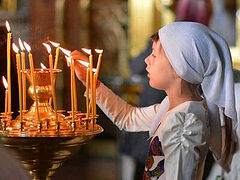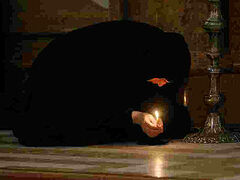The season of the virtues now has come… Let us not hold back with darkened face,
but let us keep the Fast, offering tears, contrition… and let us cry:
our sins are more in number than the sand of the sea,
but, Deliverer of all, forgive each one of us…
(Kontakion of the Second Sunday)
The present time of the Holy Forty Days is truly the most favorable, the most salvific time for the work of grace, for the purification of souls and bodies, for the healing of our spiritual ailments. Together with the Apostle, we can fully say: Behold, now is the accepted time; behold, now is the day of salvation (2 Cor. 6:2).
And the holy Church has been preparing us for this time for a while, as a great and special endeavor for all Christians. It especially prepared us in the preceding four weeks. By the example of the publican, it taught us humble and contrite prayer; by the example of the return of the prodigal son to his father, it called us to turn from our sins to the mercy of the Heavenly Father; by presenting us with the Dread Judgment it awakened us from our carelessness and negligence with the fear of future condemnation; and finally, it prepared us this past Sunday with the memory of the lamentable fall of our forefathers, and together with it, the common fall of all mankind; then it led us into the upcoming feat of fasting and repentance for the purification of our sins and transgressions.
The holy Church, our mentor and guide on the path of salvation, has taught us from childhood to look at the Holy Forty Days with special reverence, to especially spend this holy time in prayer and repentance, in laying aside our ordinary consolations; to gather ourselves from the weight of everyday vanities in this peaceful time, having examined our sinful wounds, to take care for their healing, realizing our delusion and our wandering along stubborn paths; to direct our steps on the path of righteousness and truth.
And who among us isn’t afflicted, who doesn’t wander, who isn’t overwhelmed by waves of passions and vices? One is afflicted with avarice, another drowns in lust, another is overthrown by pride, another is overcome by anger, enmity, by remembrance of wrongs, another is enslaved by laziness, absentmindedness, inconstancy, frivolity. The sins of some are obvious, and lead directly to condemnation; for others they’re in secret, but all the more dangerous because they secretly dig up the abyss of perdition for them.
What are we to do? We must heal both our obvious and secret ailments. How? With weeping, lamenting, mourning, self-condemnation, and separating ourselves from whatever has brought us into spiritual disorder. We must turn sinful laughter into weeping, illicit joy into lamentation. Casting off and separating ourselves from what we used to sinfully console and destroy ourselves with, we must correct and restore ourselves with opposite influences.
Inattention has made us careless, sensual pleasures have enslaved the spirit to the flesh, our inattentiveness to ourselves has made us weak in the performance of our duties, has deprived us of possession over ourselves, and made us victims of our self-love, concupiscence, and greed. To heal these spiritual maladies, we must gather ourselves, remember our duty and our work, shield all our senses with temperance, deprive our palates of delectables, deprive our laziness of rest, avert our gaze from seductions, our ears from allurements; we must draw near to God, fix our eye on the contemplation of the presence of God everywhere, bend our ears in obedience to the word of Christ, humble ourselves before God; and in the fear of God, having cleansed our hands from unrighteousness, our feet from the obstinate way, our tongue from verbosity and condemnation, turn our hands to charity, our feet to the paths of salvation, our tongue to praising God, to the confirmation and edification of others.
Now is the time for labor. Let us rise up, fasting; let us bring tears of tenderness, calling out in repentance both by word and deed: “O Merciful One, have mercy on us, who have fallen.”
When entering this holy arena, we must care for this above all, so that this sacred time of spiritual healing would be spent with true spiritual benefit. But we can’t spend this sacred time with spiritual benefit if, having called upon the Lord for help, we don’t strengthen ourselves with a firm determination to attend to ourselves in order to vigilantly, unremittingly ever restrain ourselves in all that is dangerous for our external and internal purity; if we don’t do everything we can to arouse ourselves to reverence before God, to meekness and humility before others; if we don’t guard ourselves with warm, fervent prayer in the morning, with vigorous work during the day, and strict testing of our heart and conscience at night upon our beds.
Let us walk the path of fasting as the path of blessed enlightenment of the mind, purification of the heart, and strengthening of the will for goodness; let us walk in firm hope in God in mutual peace and kindness for each other, in he good determination of spirit to correct ourselves by all means, and to prepare ourselves before God for every good work.
Let us, as far as possible, cleanse our bodies with temperance; let us enlighten our souls with prayer and contemplation; let us close our senses off from everything harmful; let us open them to everything that is capable of nourishing in us the fear of God and repentance for our sins; let us turn our gaze from everything tempting, from everything revolting to our inner senses, so that it might see the crucified Lord above all; let the ear resound only with the word of God and the good news of peace, of mutual edification, of consolation; may our tongues first utter a word of prayer, and then utter words of reverence and the fear of God, words of sound reasoning and blessed sentiments.
Let us thus complete the arena of fasting, that having fasted bodily, we might fast spiritually—and reaching ahead, we might not weaken in this spiritual current, but by the grace of God, we might ascend from bodily to spiritual abstinence, to the labor of mortifying the flesh and crucifying the lusts and passions. And we believe that the Lord will give us strength according to the measure of our labors, and will give us grace-filled consolation according to the measure of our inner lamentation.
Amen.




